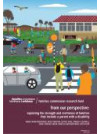This report examines the strength and resilience of families that include a parent with a disability. The purpose of this exploration is to learn how to tailor research and practice to better meet the needs of these families. Disabilities are often viewed from a deficit perspective, obscuring the strengths that co-exist alongside disabilities. In this report we aim to highlight the families’ strengths without diminishing the challenges that they faced and resilience they demonstrated.
Walsh (2006) stated, “Resilience can be defined as the capacity to rebound from adversity strengthened and more resourceful” (p. 4). Resilience is often viewed as bouncing back to one’s original state after a difficult circumstance. However, families face many kinds of challenges, which are often ongoing. Walsh has suggested that a more suitable metaphor for resilience is that of “bouncing forward” (p. 84). Resilient families adapt and change to move on with their lives amidst the challenges.
Parenting with a disability can pose a number of challenges. Many parents with disabilities face economic hardship and employment challenges. Some face prejudicial attitudes from professionals and community members. Disability support needs change over time, as do the needs of growing children. To gain a better understanding of how families bounce forward amidst such challenges and changing circumstances, we interviewed 20 New Zealand families that include a parent with a disability. More than 20 different disabilities were represented in this study. The following themes summarise the parents’ experiences: (a) mobility difficulties; (b) mental health conditions; (c) chronic pain; (d) learning and processing differences; and (e) sensory impairments.
Purpose
Despite the universality of disability, studies of parents with a disability are “relatively scarce” (Drew, 2009, p. 431) and parents with a disability are often viewed through a “pathologising lens” in research and practice (Kirshbaum & Olkin, 2002, p. 77). All too often one’s disability is viewed more prominently than one’s strengths and resilience. For example, an Australian study found a “significant over-representation of parents with psychiatric disability and of parents with intellectual disability in the NSW Children’s Court” (Llewellyn, McConnell, & Ferronato, 2003, p. 248). Johnson, Henaghan and Mirfin-Veitch (2007) describe some of the difficulties that parents with an intellectual disability have faced in the New Zealand Court System.
Rather than viewing parents with a disability through a deficit perspective, this study seeks to explore family life by focusing on the strengths, abilities and resilience that lead to positive outcomes. In 2005 and 2006, the Families Commission explored what contributes to positive outcomes for New Zealand families with dependent children. Seth-Purdie, Cameron and Luketina (2006) identified “key factors that enhance family life to be: having time with the family, having good relationships with family members, having access to family and community support, and being able to live according to one’s values” (p. 7). Being able to access appropriate family and community support is even more important for parents with disabilities, who often need ongoing support.
Methodology
We talked to 20 mothers, 10 fathers, 19 children and 11 family friends. By maintaining a strengths-based perspective we sought to gain a better understanding of how to promote the wellbeing of families and foster family resilience.
The research was conducted in the Canterbury region of New Zealand between 2009 and 2011. Eighteen of the families were recruited from Christchurch City. One family was from the Waimakariri District and the other was from the Kaikoura District. The last census was done in 2006. At that time, the population of Christchurch City was 348,435 and the city had two major tertiary institutions, nine major hospital, and 164 schools (Christchurch City Council, 2007). Following major earthquakes1 in 2010 and 2011 “Christchurch City’s resident population decreased by 8,900 people (2.4 percent) in the June 2011 year”.
Key Results
The findings from this study suggest five principles to bear in mind when engaging with families that include a parent with a disability:
- Every family is unique. While there are general principles that can be applied to many families, there is no ‘one size fits all’ model. Take time to get to know the specific family you are engaging with.
- Disabilities co-exist with abilities and strengths. When engaging with families, keep their abilities and strengths at the forefront because these will buoy them when they encounter challenges.
- Spending time together having fun helps to build family resilience. Appointments with professionals, time spent in hospitals, time spent in therapy and the ordinary demands of family life can crowd out time for fun. When suggesting interventions for families, it is important that professionals safeguard families’ downtime. Extended family, whānau and the wider community can play a vital role in providing opportunities for families to have fun together.
- Families function as a unit. In a family situation, a parent’s disability is not theirs alone; family members adapt and work together to meet the demands of family life. Support and interventions targeted to individuals alone do not harness the strengths within the family unit. Some parents with a disability in this study expressed distress at having their partnersexcluded from meetings with professionals.
- Poverty and social isolation are challenges in themselves. When families that include a parent with a disability are facing numerous challenges, the root cause may be underlying poverty or social isolation, rather than the disability itself. When families are well resourced, financially and socially, they are better able to meet day-to-day challenges posed by the disability.

